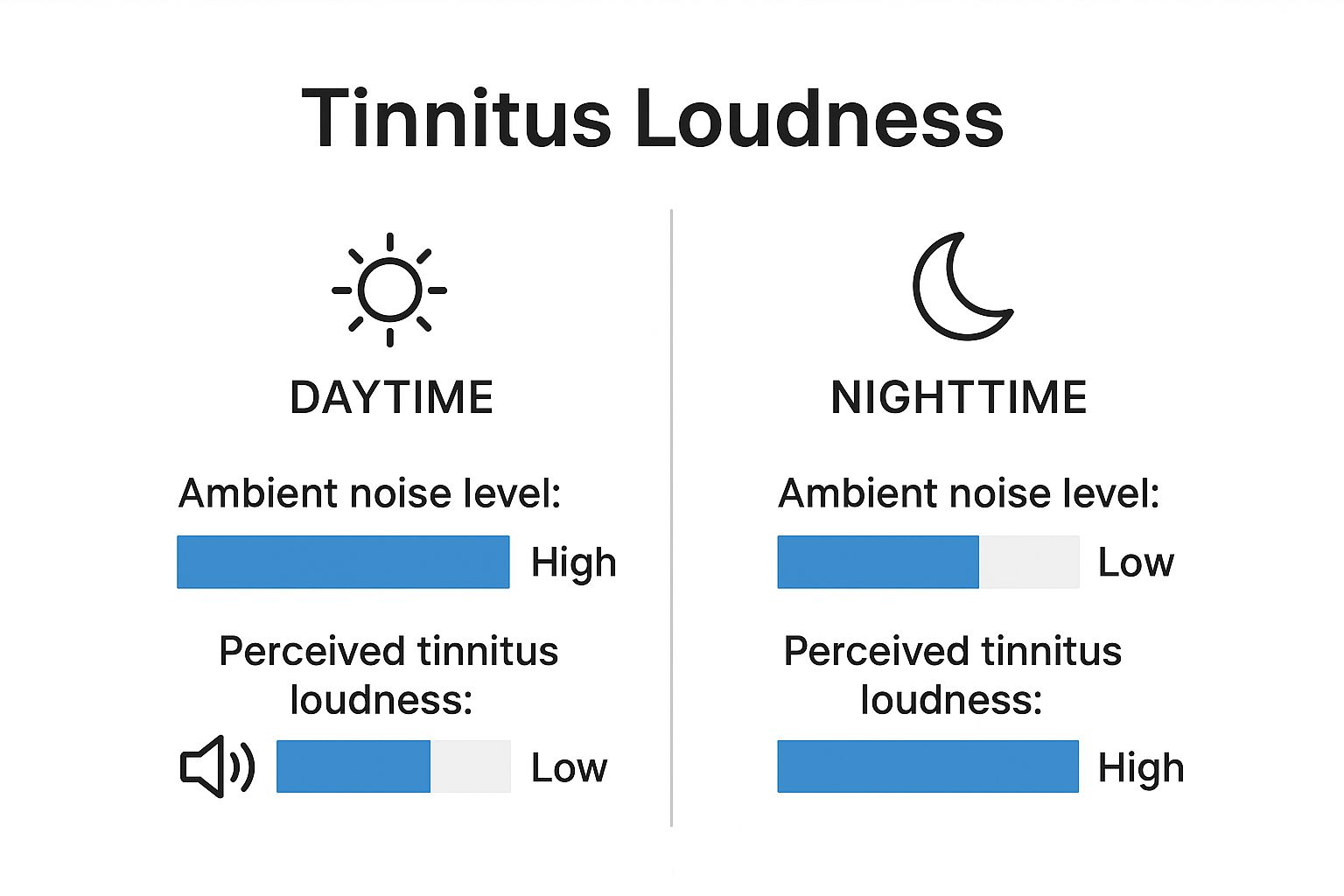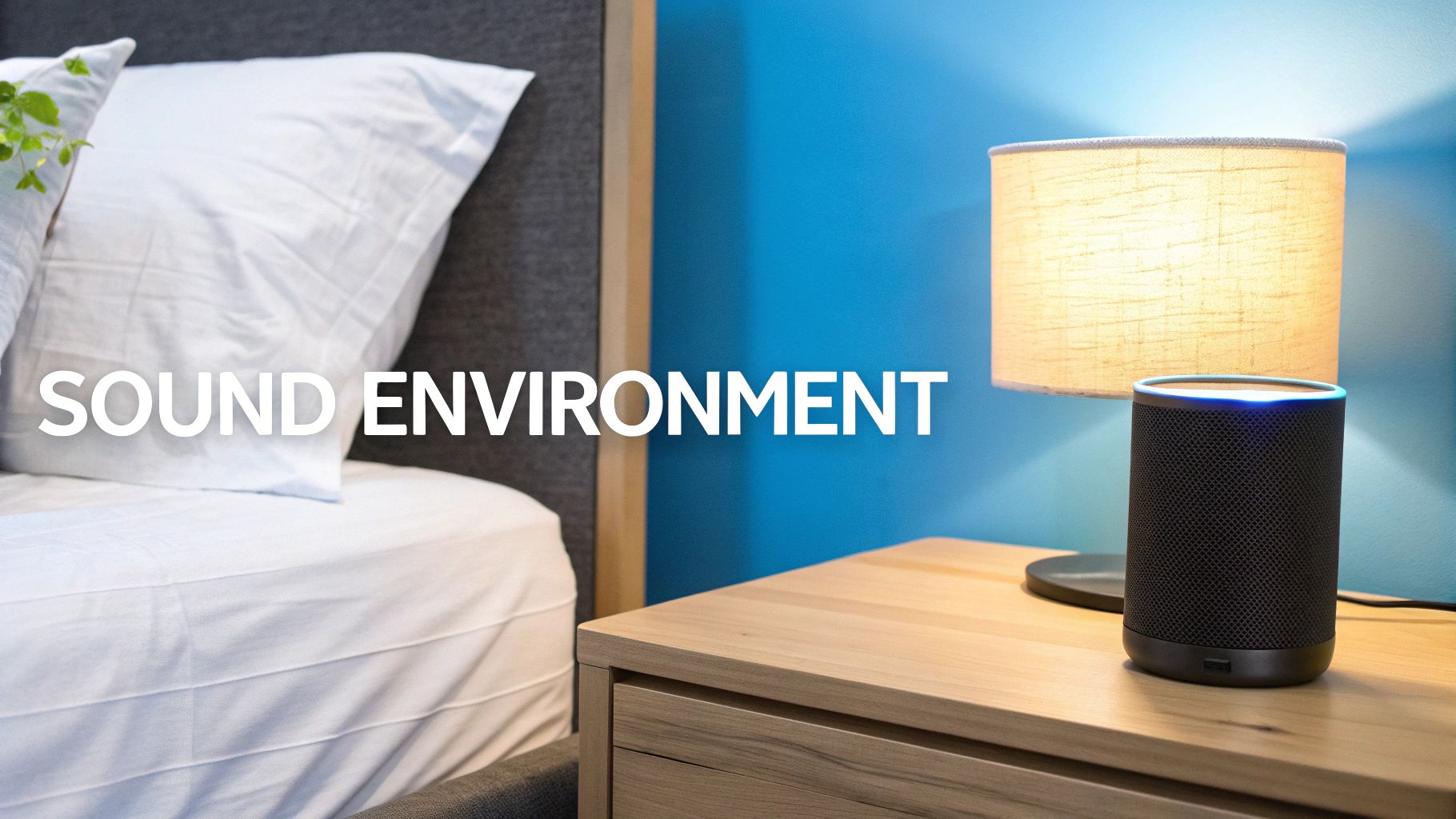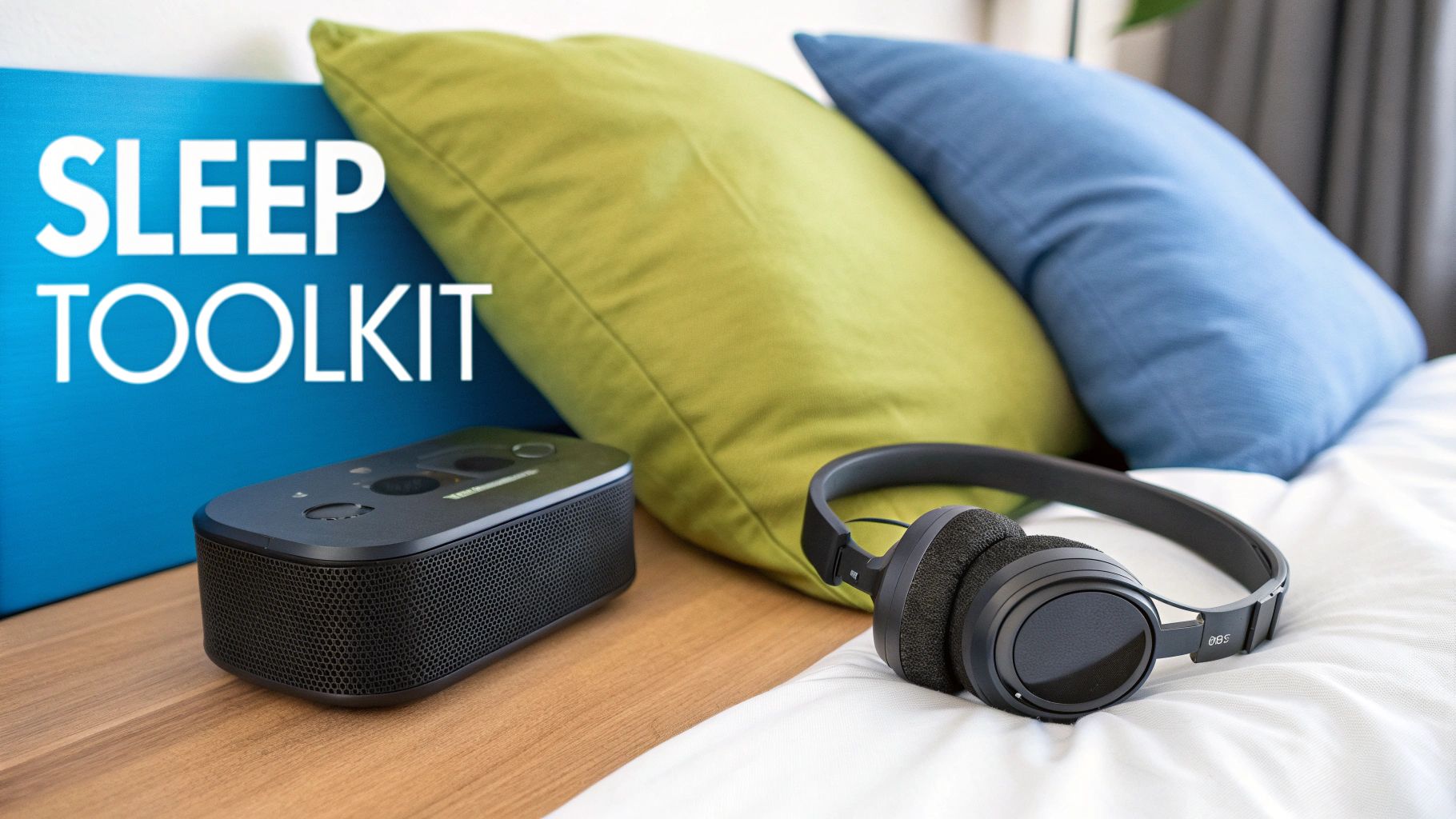Having trouble sleeping with tinnitus? I get it. The key isn’t trying to force silence—that’s a losing battle. It’s about managing the stark contrast between the quiet of your room and that internal ringing. You do that by creating a calming, sound-rich environment.
This approach uses a blend of gentle background noise and relaxation techniques to basically teach your brain to tune out the tinnitus.
Why Tinnitus Gets Louder at Night
If you've ever felt like your tinnitus cranks up the volume the second your head hits the pillow, you're not imagining things. It’s a super common experience, and it’s all about perception, not reality.
During the day, your brain is constantly juggling external sounds—traffic, conversations, music, the hum of the fridge. This everyday noise naturally masks the internal sound of your tinnitus, pushing it way into the background. Most of the time, you don't even notice it's there.
But when your world goes quiet at night, all those external sounds fade away. Suddenly, your brain has nothing else to focus on, so it zooms in on the only sound left: that persistent ringing in your ears. It’s a frustrating cycle—the quiet you need for sleep is the very thing that makes your tinnitus feel impossible to ignore.
This is a great way to visualize the relationship between ambient noise and how loud your tinnitus seems.

As you can see, the high noise levels during the day make tinnitus way less noticeable. But when things go silent at night, it feels so much more intense.
The Brain's Role in Amplifying Sound
Understanding this dynamic is the first step toward getting some relief. It’s not just about the sound itself, but also about how your nervous system reacts to it.
When you’re stressed or anxious about not being able to sleep (a perfectly normal reaction!), your body's "fight-or-flight" response can kick in. This makes you even more sensitive and alert to the sound. It creates a nasty feedback loop: tinnitus messes with your sleep, lack of sleep causes stress, and that stress makes the tinnitus seem even louder.
And if you're dealing with this nightly struggle, you're far from alone. The global prevalence of tinnitus is surprisingly high. A 2022 systematic review estimated that about 14% of adults experience it in some form. That number jumps even higher with age, affecting 24% of older adults. You can read the full research on tinnitus prevalence to see just how significant of a global health issue this is.
The goal isn't to achieve complete silence. With tinnitus, that's just not going to happen. Instead, the most effective strategy is to reshape your relationship with the sound by intentionally adding gentle, consistent audio back into your environment.
This guide is going to move beyond the useless advice to just "ignore it." We’ll walk through practical, real-world strategies you can start using tonight to finally break that cycle. The key is to take a multi-faceted approach:
- Creating a sound-rich environment to give your brain something else to latch onto.
- Calming your nervous system to dial down the stress that makes tinnitus worse.
- Optimizing your sleep routine to build up your resilience against disruptions.
Building Your Ideal Sound Environment for Sleep

If you're dealing with tinnitus, one of the most powerful things you can do is create a sound-rich bedroom. The old advice to aim for total silence? It usually backfires. A completely quiet room leaves your brain with nothing else to focus on but that persistent ringing.
The goal isn't to blast noise to drown out the tinnitus. That's a common misconception. The real strategy is called sound masking, and it’s much more subtle. It's about introducing a gentle, consistent background sound to give your auditory system something else—something more pleasant—to latch onto.
Finding Your Perfect Audio Blanket
Here’s an analogy I like to use: Think of your tinnitus as a single, flickering candle in a pitch-black room. That tiny flame seems incredibly bright and distracting, right?
Now, imagine turning on a soft lamp in that same room. The candlelight doesn't vanish, but it suddenly blends into the background, becoming far less noticeable. Sound masking does the exact same thing for your ears.
The type of sound you choose matters, as different "colors" of noise have their own unique frequencies.
- White Noise: This one contains all audible frequencies in equal measure. It’s the classic "shhhh" sound, a bit like radio static or a fan. It’s fantastic for masking a really wide range of tinnitus pitches.
- Pink Noise: A little deeper than white noise, with more power in the lower frequencies. A lot of people find it less harsh, comparing it to the sound of steady rain or leaves rustling in the wind.
- Brown Noise: Even deeper and more bass-heavy. This is often described as a low roar, like a strong waterfall. It can be especially soothing if you have low-frequency tinnitus.
The real secret is finding the volume "sweet spot." You want to set your masking sound just below the level of your own tinnitus. This allows your brain to hear both sounds, which, over time, helps it learn to reclassify the tinnitus as just another unimportant background noise.
Tools for Crafting Your Soundscape
You really don’t need to break the bank to get started. Many of the most effective tools are easy to find and can be slipped right into your nightly routine. For a deeper dive, our guide explains in detail how white noise can help you sleep and the benefits it offers beyond just tinnitus relief.
But to get you started, let's look at some of the most common options people turn to.
Comparing Sound Masking Options for Tinnitus
Choosing the right tool depends on your lifestyle, budget, and what you find most comforting. Here’s a quick breakdown of the popular choices to help you decide.
| Sound Source | Pros | Cons | Best For |
|---|---|---|---|
| Dedicated Sound Machine | High-quality, non-looping audio designed for sleep. Very simple to operate. | Can be an added expense. Basic models might have limited sound options. | Someone who wants a reliable, set-it-and-forget-it solution for their nightstand. |
| Smartphone Apps | Huge variety of sounds, customizable mixes, and often free or low-cost. | Can be distracting (blue light, notifications). May drain your phone's battery. | Tech-savvy folks who enjoy experimenting with different soundscapes. |
| Smart Speaker | Voice-activated and super convenient. Can play a wide range of sounds. | Audio quality can be inconsistent. Potential privacy concerns for some users. | People who already have a smart home setup and love the convenience. |
Ultimately, finding what helps you is a personal journey. What works wonders for one person might not do a thing for another, simply because the pitch and tone of tinnitus are so individual.
Don't be afraid to experiment. Spend some time trying different sounds, different devices, and different volumes. Discovering what gives you the most relief is a foundational step in learning how to sleep peacefully with tinnitus.
Using Relaxation to Break the Stress Cycle

If you've ever had a long, stressful day only to find your tinnitus screaming at you that night, you're not imagining things. There's a direct line between your nervous system and how you perceive that ringing sound. It's your body's "fight-or-flight" response kicking in, making you hyper-aware of potential threats—and right now, that threat feels like the noise inside your own head.
This kicks off a nasty feedback loop. Tinnitus wrecks your sleep, a lack of sleep makes you stressed, and stress cranks up the volume on your tinnitus. Breaking this cycle is absolutely essential to finding some quiet at night. The best tools are often the simplest relaxation techniques you can do without even getting out of bed. These practices gently calm your nervous system, which can feel like turning down the volume knob on your tinnitus.
The mental weight of tinnitus is real, especially when it steals your rest. A revealing study found that over half (54.2%) of tinnitus patients also had a sleep disorder, and nearly 20% struggled with anxiety. The researchers discovered that poor sleep was a huge amplifier, mediating about 28% of the effect tinnitus severity had on anxiety. You can read the full findings on tinnitus and mental well-being to see just how intertwined these issues are.
In-Bed Techniques to Calm Your Mind
You don’t need a special cushion or a silent retreat. These are things you can do right now, at 2 AM, when the ringing is loud and your mind just won't shut off.
The 4-7-8 Breathing Technique
This is a ridiculously simple but powerful exercise for telling your body it's time to chill out. It activates your parasympathetic nervous system—the "rest-and-digest" side—signaling to your brain that it's safe to relax.
- Breathe out completely through your mouth with a little "whoosh" sound.
- Close your mouth and breathe in quietly through your nose for a count of four.
- Hold that breath for a count of seven.
- Breathe out completely through your mouth, making that "whoosh" sound again, for a count of eight.
Just do this three or four times. The key is to focus entirely on the counting and the physical sensation of your breath moving in and out.
Progressive Muscle Relaxation (PMR)
PMR is a game-changer for releasing physical tension you don't even know you're carrying. The idea is to systematically tense and then fully release different muscle groups, one by one.
- Start with your feet. Curl your toes tightly for five seconds, then let them go completely limp.
- Work your way up your body: calves, thighs, glutes, abdomen, chest.
- Finish with your hands (make fists), arms, shoulders, and even the tiny muscles in your face.
By the time you're done, your whole body should feel heavy and loose, making it much easier to sink into sleep.
Tinnitus thrives on a stressed and alert brain. By deliberately calming your body with techniques like deep breathing and muscle relaxation, you actively create an internal environment where the ringing is less intrusive and easier to ignore.
Guided Meditation and Visualization
Sometimes your own brain is the last place you want to be. That's where guided meditation comes in. Having a calm voice guide your focus away from the ringing can be a lifesaver. Apps or audio tracks can walk you through peaceful scenes, giving your mind a welcome distraction from the tinnitus.
We have a whole guide on how to use meditation for better rest if you want to dive deeper. These tools are perfect for nights when your mind feels too scattered to calm down on its own.
How Better Sleep Hygiene Reduces Tinnitus
You’ve probably heard the term "sleep hygiene" before, but it's more than just a buzzword. For anyone learning how to live with tinnitus, it's one of the most powerful tools in your arsenal. Think of it as reinforcing your entire sleep system. When you're running on fumes from sleep deprivation, your brain's sensitivity to internal noise gets dialed way up, making that ringing seem much louder.
The science backs this up, big time. One major U.S. study drew a direct line between poor sleep and bothersome tinnitus. People getting less than 8 hours of sleep had 28% higher odds of experiencing it. Even worse, those who just had general trouble sleeping saw their odds jump by a staggering 78%. You can dig into the specifics of these findings on sleep and tinnitus yourself.
Create a Tinnitus-Focused Nightly Routine
Your body absolutely loves consistency. It runs on an internal clock, your circadian rhythm, which helps regulate the hormones that tell you when it’s time to sleep and when to be alert.
That's why going to bed and waking up around the same time every single day—yep, weekends too—is so effective. It’s like sending a clear signal to your brain that it’s time to wind down. This kind of stability makes your whole system less prone to being thrown off by the disruptions from tinnitus.
Another game-changer is carving out a screen-free hour before bed. The blue light blasting from our phones, tablets, and TVs is a notorious melatonin-killer. Melatonin is the very hormone your body needs to feel sleepy, so cutting out screens gives it a chance to do its job.
A consistent nightly routine does more than just prepare you for sleep. It creates a predictable buffer zone between your busy day and your quiet bedroom, helping to calm the nervous system that often amplifies tinnitus.
Watch What You Consume Before Bed
What you put into your body, especially in the evening, can directly mess with both your sleep quality and your tinnitus. Some substances are particularly notorious for causing trouble.
-
Caffeine: This one's a no-brainer. As a stimulant, caffeine can hang around in your system for hours. Make it a hard rule to avoid coffee, caffeinated tea, and sodas for at least six hours before your head hits the pillow.
-
Alcohol: A nightcap might feel like it helps you doze off, but don't be fooled. Alcohol seriously disrupts your sleep later in the night, leading to fragmented, low-quality rest. You wake up feeling more tired, which often makes your tinnitus more noticeable the next day.
-
High-Sodium Foods: For some people, too much salt can lead to higher blood pressure and fluid retention, which can make tinnitus worse. Be mindful of those salty late-night snacks or heavy, sodium-rich meals close to bedtime.
By making these small, deliberate adjustments to your habits, you start building a solid foundation for truly restorative sleep. It’s a proactive way to manage tinnitus, making that sound less of an obstacle and more of a background noise you can finally tune out.
Finding the Right Tools for a Quiet Night

Putting together a personalized sleep toolkit can make all the difference when you're trying to figure out how to sleep with tinnitus. The right gear can tackle physical discomfort and make your sound masking strategy way more effective.
If you’ve ever tried to fall asleep on your side with a pair of standard earbuds in, you already know the problem. They’re bulky, they dig into your ear, and they almost always fall out by morning.
This is where equipment designed specifically for sleep becomes a total game-changer. You need tools that work with you, not against you, as you settle in. The goal is to create an environment so comfortable and seamless that you forget you’re even using them.
Rethinking Your Nighttime Audio
For anyone who relies on sound masking, audiobooks, or guided meditations to drift off, comfortable headphones are absolutely non-negotiable. Standard earbuds just create painful pressure points when you lie on them, making sleep next to impossible. That's why sleep-specific headphones like Bedphones are so essential.
Their design is built around one key idea: comfort for every kind of sleeper.
- Ultra-Thin Speakers: The speakers are incredibly thin and padded with soft foam, so you can lie directly on your ear without feeling any hard plastic digging into you.
- Adjustable and Secure Fit: They’re designed to stay put all night long, even if you toss and turn. No more waking up at 3 AM because your sound masking suddenly cut out.
- Partner-Friendly Audio: The on-ear style delivers sound directly to you without leaking into the room, so you won’t disturb a sleeping partner. This is a huge win if they’re a light sleeper.
Having the right headphones means you can finally get the benefits of nighttime audio without having to sacrifice comfort. It bridges the gap between needing sound and being able to physically tolerate it all night.
Exploring Other Helpful Sleep Tools
Beyond headphones, other tools can help with different aspects of sleep disruption. This is especially true if your tinnitus seems connected to physical tension in your neck and jaw—a condition sometimes called somatic tinnitus.
A specialized pillow, for example, can be a surprisingly effective part of your strategy. A good contoured memory foam pillow can help align your neck and spine, easing the muscular strain that might be making your tinnitus worse. Reducing that physical stress can sometimes lead to a noticeable drop in the perceived volume of the ringing.
The key is to think about your comfort from every angle. If you’re also dealing with external noises, like a snoring partner, your strategy might need another layer. For some ideas on managing those kinds of disruptions, you might want to check out our guide to sleeping peacefully next to a partner who snores.
By combining the right tools, you can build a solid defense against everything that stands between you and a quiet, restful night.
Even after you’ve dialed in your sound masking and relaxation routine, you might still have a few lingering questions. That’s completely normal. Let’s walk through some of the most common ones that pop up when people are trying to nail down their perfect night of sleep with tinnitus.
Will Sound Masking Make My Tinnitus Worse?
This is a big one, and it's a totally understandable fear. But the answer is a firm no—as long as you’re doing it right, it’s actually helping.
The goal isn't to blast a sound so loud that it completely drowns out the ringing. It’s more subtle than that. You want to set your background sound just below the volume of your own tinnitus.
This gentle approach encourages a process called habituation. It's a bit of a clinical term, but all it means is you’re teaching your brain to file the tinnitus sound under "unimportant background noise." Over time, your brain learns to ignore it, making the ringing far less noticeable, day and night. Think of it less as covering a sound and more as retraining your brain's reaction to it.
What Kind of Doctor Can Help with Tinnitus and Sleep?
Finding the right professional is a game-changer. A great place to start is with an audiologist who has a special focus on tinnitus. They can run detailed hearing tests to figure out the specific frequency of your tinnitus and recommend sound therapies that are fine-tuned just for you.
It's also a smart move to see an Otolaryngologist (an ENT doctor). They can help rule out any underlying medical conditions that might be causing the ringing in the first place. And if you find that stress and anxiety are pouring fuel on the fire, a therapist who specializes in Cognitive Behavioral Therapy (CBT) can be invaluable. They give you the tools to break those frustrating thought patterns that create the vicious tinnitus-insomnia cycle.
Can My Sleeping Position Affect My Tinnitus?
For some people, absolutely. This is especially true if you have what’s known as somatic tinnitus, which is linked to physical tension and movement in your head, neck, and jaw.
If you sleep in an awkward position that strains your neck or makes you clench your jaw, you might notice your tinnitus spikes. It's worth experimenting a bit. Try a more supportive pillow, or sleep on your back with your head slightly elevated. Sometimes these simple adjustments can take the pressure off and bring surprising relief.
Tinnitus isn't just about what you hear; it's deeply connected to your nervous and musculoskeletal systems. Don't underestimate how much a small tweak to your sleep posture can help.
Is It Safe to Wear Sleep Headphones All Night?
Yes, it’s perfectly safe—with one important rule: keep the volume low. You're aiming for a gentle, background texture, not a rock concert in your ears.
Products like Bedphones were created for this very reason. They use ultra-thin speakers that won't create painful pressure points, even when you’re sleeping on your side all night. The key is to keep the volume low enough that you'd still be able to hear important sounds, like a smoke alarm going off or a child calling for you. This is a standard, safe, and incredibly effective part of modern tinnitus management that can help you finally get the rest you deserve.
Finding the right tools can feel like a turning point. At DubsLabs, we designed Bedphones to solve the exact comfort and sound-delivery problems that make sleeping with tinnitus so difficult. Experience the difference a comfortable, all-night audio solution can make.











































